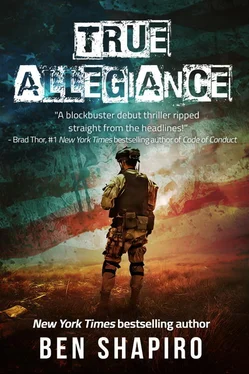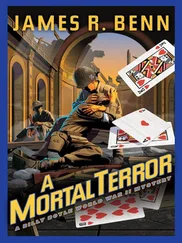Brett nodded. “Something like that.”
“Now why would he go and do something like that?”
“You leave that to me. What’s his address?”
It took Brett a bit over an hour to reach the imam’s home outside the I-287 loop. The imam actually lived on a rural compound off the road. In the dark, Brett missed the turnoff twice. The gravel clanked off the underside of the cheap Toyota Hassan had borrowed from a friend. The woods showed black against the early glimmers of rising sun. In the distance, Brett could see that the light was already on in the home— fajr prayers, the earliest prayers. By the time he drove up, the front door was already open. A thick oak of a man stood in the doorway, bearded, wearing a taquiyeh .
Brett stopped the car in a cloud of dust.
“Hello,” he said. “I’m here to see the imam.”
“It’s early,” said the man. “The imam’s office opens at 9:00 a.m.”
“Tell him the Teacher sent me.”
The mention of Ashammi’s nickname caught the oak man up short. He took a step forward. “We know nobody of that name.”
A hand crept up on the guard’s shoulder. Then the soft voice of the imam. “It’s all right, Mahmoud. I know this man.” The guard moved aside, revealing a white-bearded, fiftyish, willowy man. His deep-set eyes gazed out at Brett, seemingly looking beyond him. Brett found it slightly unsettling. “Come in,” said the imam.
Anjem Omari, Hassan had told Brett before Brett left for Jersey, was no one to be trifled with. He’d been rumored to have deep connections to various Middle East–based charities with their own connections to various terror groups. He fronted for a variety of Islamic human rights organizations dedicated to fighting Islamophobia, and it was in that guise that he’d become a go-to face for Prescott. The Prescott tenure had seen several small, lone-wolf attacks; each time, Prescott had cited Omari as evidence that the moderate Muslim community was alive and well in the United States. Omari spoke frequently about jihad as an internal struggle; he denounced terrorism, but evenhandedly decried American occupation of the Middle East and Israeli actions against Palestinians. His frequent appearances on network news made him a well-established media personality.
Now he ushered Brett into his richly decorated library, mahogany and grand, pictures of himself with Prescott and past presidents lining the walls. He sent his oak man for some tea. This time, Brett accepted. When the guard was gone, Omari turned his distant gaze to Brett—and the distance suddenly disappeared. Hassan , Brett thought, wasn’t lying .
“So,” said the imam, “what can I do for you, General Hawthorne? I am so glad you made it back to us in one piece. Allah must have protected you from harm.”
“Indeed, he must have,” said Brett. “I come here seeking your advice and help.”
“And yet you mentioned the Teacher. Why would you think I know such a monster?”
“No reason,” Brett said carefully. “But I am looking for a man, and I think that, given your prominence, he might approach you.”
“I’m approached by many Muslims. I am blessed by Allah in having a wide following and a grand platform. How would I know the man you seek?”
“His name is Mohammed,” Brett explained. “I know exactly who he is. He is perhaps seventeen years old. His beard is not yet fully grown. And I know that if he came to you, you would surely turn away his advances, thanks to his relationship with the Teacher. But you might also hope to convince him over time to join you in your cause, and leave his radicalism behind. After all, you are an influential voice.”
The corner of Omari’s mouth turned upward in a humorless grin. “Perhaps, General,” he murmured. Then, louder. “But I know of no such man. Or rather, I know of too many such men.”
“I think you do.”
“Are you implying that I’m lying to you?”
“No,” said Brett. “I’m flat-out telling you you’re lying. I know you know such a man. So either you can continue spouting this line of bullshit and I can have you detained and questioned, or you can tell me the truth.”
Omari laughed out loud. “No, I don’t think you have that sort of pull, General. You may be a hotshot with a particular segment of the population, but, as you say, I am somewhat well connected. Gentlemen, please come in.”
The door behind Brett opened. In came the federal agent from the hotel, his face impassive. Another black suit–clad fed stood next to him. Brett pushed himself to his feet. “Imam, I believe we’ll be talking again.”
Omari stood as well, looked Brett in the eye. “No, I don’t believe we will.”
President Prescott

New York City
“YOU HAVE GOT TO BE kidding me with this,” Mark Prescott said. His eyes bulged. His face had turned beet red. “I’m trying to hold the country together, and you’re out there fucking supporting the enemy by targeting Muslims? How am I supposed to counter the accusations?”
Brett sat on the couch, watching the president rage at him. On the way to the hotel, the Secret Service agents had been utterly silent; they refused to answer any of his questions, give him any information at all. But Brett figured that they must have picked up Hassan as well—how else could they have found him at Omari’s?
Prescott continued to yell. “I elevated you. I made you. I saved you. And this is how you reward me?”
Brett could feel the anger building. He flexed his fist, then let it go, an old trick Ellen had taught him to take his mind off his temper. It wasn’t working.
“Tell me. I expect an answer. What were you thinking? I gave you back your life.”
“No,” Brett said softly, dangerously. “I signaled you. I told you to hit the building.”
Prescott scoffed, disbelieving. “You can’t be serious. You wanted me to start a war with Iran? After Iraq? After Afghanistan? We just finished pulling the troops out , for God’s sake. We got you out, didn’t we?”
“That wasn’t the goddamn point!” Brett never cursed, but now the filter was gone—he couldn’t hold it back any longer. “The point was that I had intelligence that said Ashammi was there. My life for his. That was my trade to make. I just needed you to do your damn part. And you chickened out. As usual.”
“I could toss you out of the military for this, General.” Prescott’s eyes were steely blue dots in a puffy red field. “You’ve gone too far this time.”
“Go ahead. I’d love to tell the press just why you did. Because you couldn’t keep this country safe. You weren’t willing to make the tough choices.”
Prescott went quiet for a moment. Then, oddly, he smiled. “Well, I’ll make this tough choice, General. At least for you. You can either walk out of here and stop this nonsense, or you can keep going. If you keep going, I’ll instruct my attorney general to draw up federal charges against you for violation of Imam Omari’s civil rights. And this time, there won’t be any sending you to Afghanistan.”
“Mr. President, I would think not. You lost that country, so there wouldn’t be much to send me to , would there? I just want you to think about this, Mr. President: all those people out there would be alive today if you’d just followed my advice. I’ll tell that to every camera I can find.”
Prescott reached down to the coffee table and picked up the remote control. He flipped the channel to CNN, where the anchors continued to gush over Prescott’s big speech. “General,” he said, “I can afford a few public relations hits right now. Rally ’round the flag effect, and all that. You’ll be seen as an ungrateful rube looking to hit back at the man who saved you.
Читать дальше













